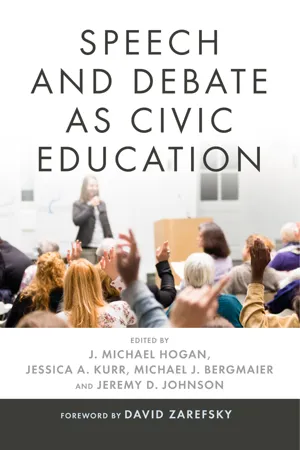
Speech and Debate as Civic Education
- English
- PDF
- Available on iOS & Android
Speech and Debate as Civic Education
About this book
In an era increasingly marked by polarized and unproductive political debates, this volume makes the case for a renewed emphasis on teaching speech and debate, both in and outside of the classroom.
Speech and debate education leads students to better understand their First Amendment rights and the power of speaking. It teaches them to work together collaboratively to solve problems, and it encourages critical thinking, reasoned and fact-based argumentation, and respect for differing viewpoints in our increasingly diverse and global society. Highlighting the need for more emphasis on the ethics and skills of democratic deliberation, the contributors to this volume—leading scholars, teachers, and coaches in speech and debate programs around the country—offer new ideas for reinvigorating curricular and co-curricular speech and debate by recovering and reinventing their historical mission as civic education.
Combining historical case studies, theoretical reflections, and reports on programs that utilize rhetorical pedagogies to educate for citizenship, Speech and Debate as Civic Education is a first-of-its-kind collection of the best ideas for reinventing and revitalizing the civic mission of speech and debate for a new generation of students.
In addition to the editors, the contributors to this volume include Jenn Anderson, Michael D. Bartanen, Ann Crigler, Sara A. Mehltretter Drury, David A. Frank, G. Thomas Goodnight, Ronald Walter Greene, Taylor W. Hahn, Darrin Hicks, Edward A. Hinck, Jin Huang, Una Kimokeo-Goes, Rebecca A. Kuehl, Lorand Laskai, Tim Lewis, Robert S. Littlefield, Allan D. Louden, Paul E. Mabrey III, Jamie McKown, Gordon R. Mitchell, Catherine H. Palczewski, Angela G. Ray, Robert C. Rowland, Minhee Son, Sarah Stone Watt, Melissa Maxcy Wade, David Weeks, Carly S. Woods, and David Zarefsky.
Tools to learn more effectively

Saving Books

Keyword Search

Annotating Text

Listen to it instead
Information
Table of contents
- COVER front
- Copyright Page
- Table of Contents
- Foreword: Speech and Debate as Civic Education: Challenges and Opportunities
- Introduction: Speech and Debate as Civic Education
- Notes to Introduction
- Part 1: History of Speech and Debate as Civic Education
- Chapter 1: Warriors and Statesmen: Debate Education among Free African American Men in Antebellum Charleston
- Notes to Chapter 1
- Chapter 2: Renewing a “Very Old Means of Education”: Civic Engagement and the Birth of Intercollegiate Debate in the United States
- Notes to Chapter 2
- Chapter 3: Taking Women Seriously: Debaters, Faculty Allies, and the Feminist Work of Debating in the 1930s and 1940s
- Notes to Chapter 3
- Chapter 4: The Intersection of Debate and Democracy: The Shifting Role of Forensics in the History of American Civic Education
- Notes to Chapter 4
- Part 2: Debate Education and Public Deliberation
- Chapter 5: Public Debate and American Democracy: Guidelines for Pedagogy
- Notes to Chapter 5
- Chapter 6: When Argumentation Backfires: The Motivated Reasoning Predicament in Speech and Debate Pedagogy
- Notes to Chapter 6
- Chapter 7: Teaching Religion through Argument, Speech, and Debate: Critiquing Logos and Mythos
- Notes to Chapter 7
- Part 3: Rethinking Competitive Speech and Debate
- Chapter 8: The Ceda–Miller Center War Powers Debates: A Case for Intercollegiate Debate’s Civic Roles
- Notes to Chapter 8
- Chapter 9: Beyond Peitho: The Women’s Debate Institute as Civic Education
- Notes to Chapter 9
- Chapter 10: Debating Conviction: From Sincere Belief to Affective Atmosphere
- Notes to Chapter 10
- Chapter 11: Debaters as Citizens: Rethinking Debate Frameworks to Address the Policy/Performance Divide
- Notes to Chapter 11
- Part 4: Cultivating Civic Skills and Literacy
- Chapter 12: Debate Activities and the Promise of Citizenship
- Notes to Chapter 12
- Chapter 13: Deliberation as Civic Education: Incorporating Public Deliberation into the Communication Studies Curriculum
- Notes to Chapter 13
- Chapter 14: Youth, Networks, and Civic Engagement: Communities of Belonging and Communities of Practice
- Notes to Chapter 14
- Chapter 15: Pathways to Civic Education: Urban Debate Leagues as Communities of Practice
- Notes to Chapter 15
- Part 5: Iinternational Collaboration and Interconnections in Debate
- Chapter 16: Comparing Argument and Debate Modes to Invoke Student Civic Engagement: Learning from “The Ben”
- Notes to Chapter 16
- Chapter 17: The Worlds-Style Debate Format: Performing Global Citizenship
- Notes to Chapter 17
- Chapter 18: Suzhi Jiaoyu, Debate, and Civic Education in China
- Notes to Chapter 18
- Notes
- Selected Bibliography
- Contributors
- Index
Frequently asked questions
- Essential is ideal for learners and professionals who enjoy exploring a wide range of subjects. Access the Essential Library with 800,000+ trusted titles and best-sellers across business, personal growth, and the humanities. Includes unlimited reading time and Standard Read Aloud voice.
- Complete: Perfect for advanced learners and researchers needing full, unrestricted access. Unlock 1.4M+ books across hundreds of subjects, including academic and specialized titles. The Complete Plan also includes advanced features like Premium Read Aloud and Research Assistant.
Please note we cannot support devices running on iOS 13 and Android 7 or earlier. Learn more about using the app